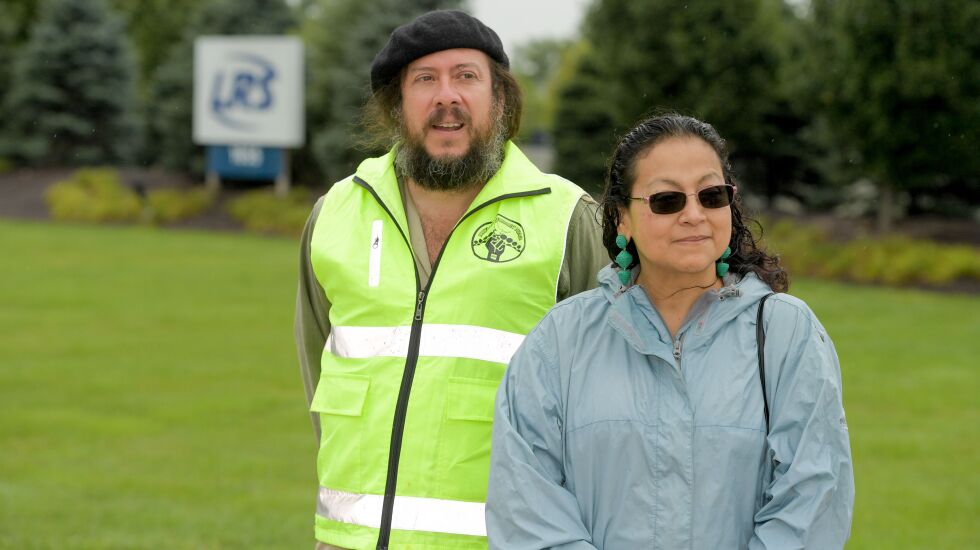
Lifelong West Chicago resident Julieta Alcántar-Garcia fears her city is on the verge of becoming a dumping ground for neighboring communities across DuPage County.
West Chicago is home to the county’s only garbage-transfer station — an in-between location before waste is hauled to a landfill. Earlier this year, city officials gave the green light to add a second facility that would be run by trash hauler LRS and bring 650 tons of solid waste a day and air pollution from hundreds of large garbage and semi-trailer trucks weekly to the city of 25,000.
“We’ve had enough,” Alcántar-Garcia said. “We need different types of jobs — something that would help our community grow.”
On Thursday, lawyers for Alcántar-Garcia will argue to state officials that the trash facility should be blocked.
The Illinois Pollution Control Board has the final say in the matter, and a panel of Gov. J.B. Pritzker’s appointees will be asked to decide whether the city of West Chicago met all the criteria to determine that the new garbage site will not harm the health of nearby residents. That final decision is expected early next year.
West Chicago is around half Latino, and that raises questions for Alcántar-Garcia’s legal team as to why it is the only DuPage County community targeted for two of these waste sites. Other municipalities, including those that are largely white and affluent, would benefit.
The site is “being promoted as beneficial to the broader, whiter and wealthier region,” said Robert Weinstock, director of Northwestern University’s Environmental Advocacy Center. “This is a textbook example of structural environmental racism.”
The planned operation by Rosemont-based LRS, formerly known as Lakeshore Recycling Systems, would be an expansion of an existing site that largely takes in construction debris.
The expanded LRS garbage site would be just south of a similar operation for Groot Industries.
The need, according to LRS, is to accommodate the waste in communities around West Chicago, including hauling from Naperville, Aurora, Wheaton and other communities in DuPage as well as parts of Kane and Will counties.

In a statement to the Sun-Times, LRS said: “We’ve worked diligently with environmental engineering firms and local government bodies to ensure we are meeting all necessary standards and criteria to safely open this facility — ultimately benefiting DuPage County and West Chicago residents, businesses and municipalities in a variety of ways.”
“The council did approve it because [LRS] met the criteria,” said West Chicago Mayor Ruben Pineda, who declined to comment further because he’s a witness in the state hearing Thursday. The decision, he added, is up to the state. “If it’s approved, so be it. If it’s not, so be it.”
In their findings, lawyers for Alcántar-Garcia’s group, People Opposing DuPage Environmental Racism, called the application “fatally flawed” and said LRS “sacrifices the interests of West Chicagoans to benefit the broader region.”
The company would show commitment to protecting the health of the community by using electric trucks in and out of the proposed site, which sits in an industrial area across from a small regional airport, the group said.
There was a language barrier with a number of Spanish-speaking residents during hearings held in January of this year, according to opponents of the LRS plan.
“Hearings were not interpreted,” Alcántar-Garcia said. “Our community, who speaks Spanish, can’t navigate the website.”
A second group, Protect West Chicago, also noted the language issue and objected to the entire process, which was not transparent, according to lawyer Ricardo Meza.
“After a series of ‘public hearings,’ the city council met in private behind closed doors to review deliberate and approve Lakeshore’s application,” Meza wrote in a filing before this week’s hearing. “No public comment was allowed, nor were the city council deliberations made in public that day.”
The plan comes at a time when West Chicago residents would like to shed their city’s toxic past and move ahead, Cristobal Cavazos, executive director of Immigrant Solidarity DuPage.
There is a cluster of four radioactive properties, formerly owned by Kerr-McGee, that are being cleaned up under a federal hazardous waste program.
“The big question is why is West Chicago picked for a second waste transfer site?” said Cavazos, who is helping lead the fight with Alcántar-Garcia. “It’s the radioactive capital of the Midwest and already has a waste transfer station.”







